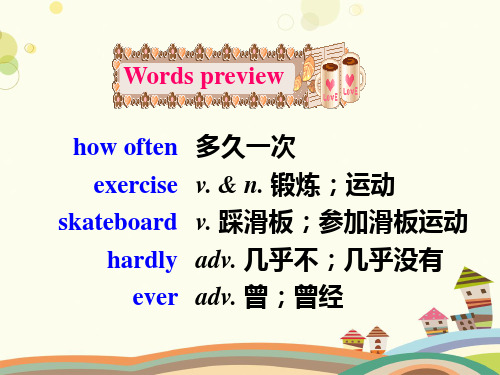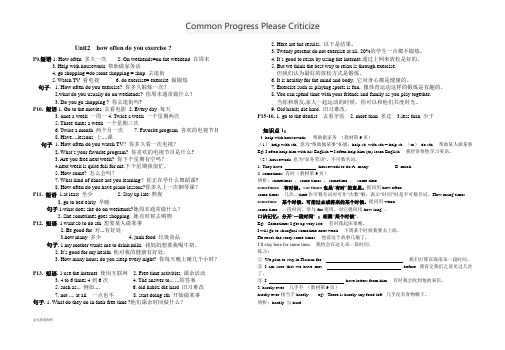2017-2018最新人教版初中八年级上册英语Unit2-How-often-do-you-exercise(4页)
- 格式:doc
- 大小:227.04 KB
- 文档页数:4


Unit 2 How often do you exercise ? Section A (1a - 2c)教学设计教学设计教学主题Unit 2 How often do you exercise ? Section A (1a - 2c)一、教材分析本课是八年级上册Unit 2 How often do you exercise ?第一课时,本单元话题切合学生生活实际,学生对此十分感兴趣。
本课主要学习频率副词的用法,了解学生做各种活动的频率,通过本课的学习,让学生学会养成良好的生活习惯和饮食习惯,从而合理安排自己的各项工作,享受丰富多彩的校园生活。
二、学生分析八年级的学生已经具有一定的英语表达能力,并且本课内容贴合学生生活实际,学生的学习积极性较高,兴趣较浓,因此,对本课的学习,难度不是很大。
但是,仍有部分学生,学习积极性不高,因此,需要教师充分利用直观教具,优化教学手段,努力创造英语学习环境,提高英语教学质量。
三、教学目标1、目标语言重点词汇:housework ,hardly ever, once, twice, Internet, program,two or three times a week重点句型1) What do you usually do on weekends?2) How often do you…?综合能力:能阅读介绍饮食习惯方面的文章2、情感渗透学会养成良好的生活习惯和饮食习惯,从而合理安排自己的各项工作,享受丰富多彩的校园生活。
四、教学环境□简易多媒体教学环境∨□交互式多媒体教学环境□网络多媒体环境教学环境□移动学习□其他五、信息技术应用思路(突出三个方面:使用哪些技术?在哪些教学环节如何使用这些技术?使用这些技术的预期效果是?)利用PPT展示所学内容,有利于调动学生的学习积极性和主动性,先有老师示范对话,询问学生周末日常活动,然后两人一组自由对话,利用图片进行。

学科:英语专题:Unit 2 How often do you exercise重难点精讲题一题面---What do you do on weekends?---I ______ (总是) go shopping with my parents, but ______ (从不) go to the movies. 模糊频率副词always, usually, often, sometimes, hardly ever, never精确的频率副词every day, once a week, twice a month, four times a year试总结频率副词的位置She is sometimes very busy.I will never forget the first time I met you.We often go to the zoo.Sometimes she writes to me.She writes to me often.这些频率副词应该放在哪里呢?He gets up at 6 o’clock every morning. (never)他每天早晨从来不在六点钟起床。
We have seen such a beautiful sunset. (rarely)我们很少看到如此美丽的日落。
They have breakfast at home. (seldom)他们很少在家里吃早餐。
She is on time. ( never)她从来不守时。
Your grandparents go out for a walk. (hardly ever)你的爷爷奶奶几乎不出去散步。
频度副词的用法often, always, usually等通常和一般现在时连用,表示现在经常或反复发生的动作。
It often rains here in April.always与进行时连用时,并不强调动作正在进行,而是表示赞叹、厌烦等情绪。

Common Progress Please Criticize金戈铁骑制作八年级上Unit2 How often do you exercise?help with housework帮助做家务on weekends在周末how often多久一次hardly ever几乎从不once a week每周一次twice a month每月两次every day每天be free=have time有空go to the movies去看电影use the Internet用互联网swing dance摇摆舞play tennis打网球stay up late熬夜;睡得很晚at least至少have dance and piano lessons上舞蹈课和钢琴课go to bed early早点睡觉play sports进行体育活动be good for对……有好处go camping去野营not…at all一点儿也不……in one’s free time在某人的业余时间the most popular最受欢迎的such as比如;诸如old habits die hard积习难改go to the dentist去看牙医morn than多于;超过less than少于help sb. with sth.帮助某人做某事How about…? ......怎么样?want sb. to do sth.想让某人做某事How many+可数名词复数+一般疑问句?……有多少……?主语+find+that从句. ……发现……spend time with sb.和某人一起度过时光It’s+ adj.+ to do sth. 做某事的……的。
ask sb. about sth.向某人询问某事by doing sth. 通过做某事the best way to do sth.做某事的最好方式What’s your favorite…?= What…do you like best? 你最喜欢的…是什么?1. Mike goes to see his grandparents _________(one) a week.2. He spends more than an hour __________(exercise) every day.3. He didn’t go to school. He could ____ ____(hard) read or write.4.To keep healthy,I decide _______ (exercise) half an hour every day.5. Your sweater is beautiful. I want _________(buy) one,too.6. How about (go) shopping on Sundays?7. He usually study English by (read) it in the morning.8.They always go to bed early,they never (熬夜).9.I go shopping (一周三次).10.Vegetables are (对……有好处)our health.11.He plays soccer (至少) four time a month.12.We found only (百分之十五) of the students exercise every day.13. --_________ _______(多久一次)does your brother exercise? --Every day.14.She is (一个五岁的) girl.15.Her parents are not very because she (几乎从不)helps with housework.16.I always eat junk food,(改为否定句) I __________ eat junk food.17.Mary is 16 years old.(改为同义句) Mary is girl.18.I go to school five days a week.(提问) do you go to school a week?19.Do you want to come? (同义句) you to come?20.She usually watches TV for over two hours a day.(同义句)She usually watches TV for two hours a day.21. She eats junk food once a week.(对画线部分提问) ______ _____ ______she eat junk food? ( )22.— do you exercise? —Hardly ever.A.How many timesB.How oftenC.WhenD.How( )23.Tom studies _______. He _______plays with his friends.A. hard; hardB. hardly; hardlyC. Hard;hardlyD. hardly; hard( )24.Jane is high school student in the United States.A.a 18-year-oldB.a 18-years-oldC.an 18-years-oldD.an 18-year-old( )25. Reading aloud is the best way English.A.to learnB.learningC.to learnD.learns。

八年级英语上册Unit 2 How often do you exercise?知识点归纳课件www.5yk八年级英语上册Unit2Howoftendoyouexercise?知识点归纳一、词组、短语:1、helpwithhousework帮助做家务活,2、goshopping购物,3、onweekends在周末,4、howoften多久一次,5、hardlyever几乎不,6、onceaweek每周一次,7、twiceamonth每月二次,8、gotothemovies去看电影,9、everyday每天,10、usetheInternet上网/用网,11、befree有空,12、havedanceandpianolessons上舞蹈钢琴课,13、swingdance摇摆舞14、playtennis打网球,15、stayuplate熬夜,16、atleast至少,17、gotobedearly早睡,18、playsports锻炼身体,19、begoodfor对…有好处,20、gocamping去野营,21、inone’sfreetime在某人的空闲时间,22、not….atall根本不,23、themostpopular最流行,24、suchas例如,25、gotothedentist去看牙医,26、morethan超过/多于,27、oldhabitsdiehard.旧习惯难改。
28、hard=difficult困难的,29、lessthan少于/不到二、重要句子(语法):whatdoyouusuallydoonweekends?你周末通常做什么?Ialwaysexercise.总是锻炼身体。
whatdotheydoonweekends?他们周末干什么?Theyoftenhelpwithhousework.他们经常帮助干家务活。
whatdoesshedoonweekends?她周末干什么?Shesometimesgoesshopping.她有时购物。

Unit2 how often do you exercise ?P9.短语1. How often 多久一次 2. On weekends=on the weekend 在周末3. Help with housework 帮助做家务活4. go shopping =do some shopping = shop 去逛街5. Watch TV 看电视6. do exercise= exercise 做锻炼句子:1. How often do you exercise? 你多久锻炼一次?2.what do you usually do on weekends? 你周末通常做什么?3. Do you go shopping ? 你去逛街吗?P10.短语1. Go to the movies 去看电影2. Every day 每天3. once a week 一周一4. Twice a week 一个星期两次5. Three times a week 一个星期三次6. Twice a month 两个月一次7. Favorite program 喜欢的电视节目8. Have....lessons 上....课句子1. How often do you watch TV?你多久看一次电视?2. What’s your favorite program? 你喜欢的电视节目是什么?3. Are you free next week? 你下个星期有空吗?4.next week is quite full for me.下个星期我很忙。
5. How come? 怎么会吗?7. What kind of dance are you learning?你正在学什么舞蹈课?8. How often do you have piano lessons?你多久上一次钢琴课?P11. 短语1.at least 至少 2. Stay up late 熬夜3. go to bed early 早睡句子1.what does she do on weekends?她周末通常做什么?2. She sometimes goes shopping. 她有时候去购物P12. 短语. 1 want sb to do sth 想要某人做某事2. Be good for 对...有好处3.how many 多少4. junk food 垃圾食品句子. 1 my mother wants me to drink milk. 我妈妈想要我喝牛奶。
八年级英语上册Unit2Howoftendoyouexercise重难点归纳单选题1、Eating more vegetables ________ good ________ your health.A.are;toB.is;toC.is;forD.are;for答案:C句意:多吃蔬菜对你的健康有好处。
根据be good for对---有好处,排除A/B;根据主语Eating more vegetables 动词做主语,谓语动词用单数形式;故选C2、—Does the dish taste as ___________ as it looks?—Yes. I can't wait to eat it.A.wellB.goodC.betterD.best答案:B句意:——这盘菜和看上去一样美味么?——是的。
我等不及吃它了。
考查形容词原形。
well健康的;good好的;better更好的;best最好的。
此处用“as+形容词原级+as…”表达“像……一样”,表达“和看上去一样美味”用as good as。
故选B。
3、Tim is young,______,he can speak three languages.A.butB.yetC.howeverD.though答案:C句意:Tim很年轻,但是他会说三种语言。
A. but但是;B. yet然而;C. however然而,可是;D. though尽管。
一般来说,but, yet不要加任何标点,而且通常放在句首,排除A/B;根据前后句的关系可知表示转折,排除D项;而however可以放在句首,句中或句末,一般加逗号。
本题的空后有逗号,故选C。
4、—Where shall we eat tonight?—Let's call Jack. He ____________ knows the best places to go.A.seldomB.alwaysC.only答案:B句意:——今天晚上我们在哪里吃饭?——让我们给Jack打电话,他总是知道最好的去处。
Unit2 How often do you exercise?Period OneTeaching Aims:1.Learn to talk about how often do you do things2.To learn the words of the adverbs of frequency.1.Mater the words and phrases in this period2.Sentence patterns: What does she /he do on weekend ? She often goes to the movies .How often do you shop ? Once a week / Twice a week ??? .Teaching Procedures:Step 1 : Greeting.1.Welcome back: Talk about their holidays.2.Encourage Ss to share their holidays with the whole class.Step 2: Leading–in1. Do you like watching TV?Yes ,I do.Do you watch TV every day?Yes, I do.2.Introduce the key vocabulary.3. Name each activity.Repeat reading the following: watch TV, read, shop, go skateboarding, exercise, draw4.Look at each picture in 1c.Tell what the person does on weekends.Check the Ss orally.1) Make sure what they will hear and do .2) Read these adverbs and explain.5.Play the tape twice .Write the letters on the line. AskSs: Well, do you still remember your last vacation?How did you spend it?Was it the same as this summer vacation?So what do you often do in your summer vacation?Then show some phrases for Ss to practice.Then present as following:always>usually>often>sometimes>hardly ever( 几乎没有 ) >neverand let them understand their differences at the first time.Step 3 : Guessing Presentation and Practice.always, usually, often, sometimes, hardly ever( 几乎没有 ) or never.And during this part, present surf the net exercise and go skateboarding.Step4 : .Do a survey:Activities How oftenTake a showerWash your hairexerciseClean your roomAsk and answer: How often do you take a shower?How often does he take a shower?Let Ss ask and answer in pairs, using always, usually, often, sometimes, hardly ever(几乎没有) or never.Step 5: HomeworkPeriod Two ( Section A2a-2b)Teaching Aims:1.Students can learn to talk about activities and how often to each other2.Students can listen, talk, read and write these words correctlyTeaching Difficulties:1.Words: once, twice, internet, program, full, swing2.Phrases: swing dance3.Sentence patterns: How often do you shop? I shop once a month.How often does Cheng watch TV? He watches TV ..Teaching Aids:Tape recorder; Multi-Media.Teaching Procedures:Step 1 : Greeting.Step 2 : RevisionWhat do you usually do on weekends?What does he usually do on weekends?What do they usually do on weekends?Step 3 : PresentationShow a calendar to students .T:What ’ s this ? Can you name it ?Ss : It ’ s a calendar .T : Very good . Look , this is the weekend . Saturday and Sunday are the weekends .What do you do on weekends ? First have students discuss and answer the question like this .A : What do you do on weekends ?B : I often play football.Then direct out“ how often⋯?”A : What do you usually watch TV on weekends ?B : I usually watch TV on weekends .A : How often do you watch TV ?B : I watch TV once a week/three times a month/every day( 告学生是表率的)⋯(The teacher must help students answer the question.因能够加学生言的感知,用个法频频两三句子,学生自然就会种言的表达了)Step 4 Listening and writingFirst have students listen listen to the tape once .At the same time , tell students the conversation about Cheng is talking how often he does different avtivities .First number the activities they hear (1-5) . Then have students listen again andtyr to match his activities with the number of times he does them .Step 5 PairworkHave students talk about what they do on weekends and How often do they do something each other ?Eg :A : What do you do sth on weekends ?B : I often do sth .A : How often do you do sth ?B : I do sth every .Then have some pairs to act out their conversations.Step5 Practise in writing .First help students finish“ question for underlined part”Eg: He goes to the movies three times a month .How often does he go to the movies ?Then have students finish the following evercises .1 . I often go to the movies . ( 划部分提)2 .他每周看一次。
Unit 2 How often do you exercise? 知识清单语言目标谈论你做事情的频率词汇SECTION A 名词:housework(家务劳动;家务事),Internet【(国际)互联网;因特网】,program(节目)形容词:full(忙的;满的;充满的)副词:hardly(几乎不;几乎没有),ever(在任何时候;从来;曾经),once(一次;曾经),twice(两次;两倍),maybe(大概;或许;可能)兼类词:swing n.(摆动;秋千)v.【(使)摆动;摇摆】,least adv.(最小;最少)adj.& pron.(最小的;最少的)SECTION B 名词:junk(无用的东西;无价值的东西),coffee(咖啡),health【健康;人的身体(或精神)状态】,result(结果;后果),percent(百分之……),television(电视节目;电视机),mind(头脑;心智),body(身体),writer(作者;作家),dentist(牙科医生),magazine(杂志;期刊),point(得分;点)动词:die(消失;灭亡;死亡)副词:together(在一起;共同),however(然而;不过),almost(几乎;差不多)介词:through(以;凭借;穿过),none(没有一个;毫无)连词:although(虽然;尽管;即使)兼类词:online adj.& adv.【在线(的);联网(的)】,such adj.& pron.(这样的;那样的;类似的),than prep.& conj.【(用于引出比较的第二部分)比】,less adv.(较少;较小)adj.&pron.(较少的;更少的)短语SECTION A how often(多久一次),on weekends(在周末),help with housework (帮忙做家务),hardly ever(几乎从不),every day(每一天),once a week(一周一次),use the Internet(使用互联网),swing dance(摇摆舞),have class(上课),stay up(熬夜),eat a healthy breakfast(吃健康的早餐),at least(至少;不少于;起码)SECTION B junk food(垃圾食品),be good for…(对…有益),how many (多少),fifteen percent of…(…的百分之十五),four to six times a week(一周四到六次),go online(上网),such as(例如;像…一样),start exercising(开始锻炼),go to the dentist(去看牙医),a 16-year-old high school student(一位16岁的高中生),more than(多于),teeth cleaning(牙齿清洁),less than(少于)SELF CHECK go to the shopping center(去购物中心)交际用语1.How often do you watch TV?你多久看一次电视?2.What do you usually do on weekends?你通常在周末做什么?3.Does Sue eat a healthy breakfast?休吃健康的早餐吗?4.She says it's good for my health.她说那对我的健康有益。
Unit2 How often do you exercise?
一.短语
1.help with housework帮助做家务on weekends在周末how often多久一次
2.hardly ever几乎从不once a week每周一次twice a month每月两次
3.every day每天be free有空go to the movies去看电影
e the Internet用互联网swing dance摇摆舞play tennis打网球5.stay up late熬夜;睡得很晚at least至少be good with与……友好相处
6.have dance and piano lessons上舞蹈课和钢琴课go to bed early早点睡觉
7.play sports进行体育活动sb. spend time with sb.和某人一起度过时光
8.be bad for对……有坏处be good for对……有好处
9.sb. spend time / money on sth.在某方面花费时间/金钱
10.sb. spend time /money (in) doing sth.在做某事上花费时间/金钱
11.be good at sth./ doing sth 擅长某事/做某事
12.be friendly with sb. 与某人友好相处be friendly to sb. 对某人友好
13.be kind to sb. 对某人友好go camping去野营
14.not…at all一点儿也不……in one’s free time在某人的业余时间
15.the most popular最受欢迎的such as比如;诸如
16.old habits die hard积习难改go to the dentist去看牙医
17.morn than多于;超过less than少于
18.help sb. with sth=help sb (to) do sth.帮助某人做某事
19.How about…? =what about …?+动词ing .....怎么样?/ …好不好?
20.want sb. to do sth.想让某人做某事
21.How many+可数名词复数+一般疑问句?……有多少……?
22.主语+find+that从句. ……发现……
23.It’s+ adj.+ to do sth. 做某事的……的。
24.ask sb. about sth.向某人询问某事ask sb. to do sth.要求某人做某事
25.by doing sth. 通过做某事the best way to do sth.做某事的最好方式25. What’s your favorite…?你最喜爱的…是什么?
=Which…do you like best? 你最喜欢…?
二.词语辨析:
1. how often多久一次,用来提问动作发生的频率。
回答用:once,twice,
three times 等词语。
Eg:How often do you play sports? Three times a week.
2. how long多长,用来询问多长时间,也可询问某物有多长。
Eg:How long does it take to get to Shanghai from here?
How long is the ruler?
3. how far 多远,用来询问距离,指路程的远近。
Eg : How far is it from here to the park? ---It’s about 2 kilometers.
4. (1)free空闲的,有空的,反义词为busy.
be free= have time. 有空,闲着
eg:I’ll be free next week. = I’ll have time next week.
(2)free还可作“免费的、自由的”解。
be free to do sth. 自由地做某事。
:egThe tickets are free. You’re free to go or to stay.
5. How come?怎么会?怎么回事?表示某件事情很奇怪,有点想不
通;可单独使用,也可引导一个问句,相当于疑问句why, 但how come 开头的特殊疑问句使用的仍然是陈述语序。
eg:How come Tom didn’t come to the party?
= Why didn’t Tom come to the party?
6. (1)stay up late指“熬夜到很晚,迟睡”。
Don’t stay up late next time.
7. (2)stay up指“熬夜,不睡觉”. He stayed up all night to write his story.
8. (1)go to bed 强调“上床睡觉”的动作及过程,但人不一定睡着。
Eg:I went to bed at eleven last night.
(2)go to sleep强调“入睡,睡着,进入梦乡”。
Eg: She was so tired that she went to sleep soon.
9. find + 宾语+名词, 发现:We have found him (to be) a good
find + 宾语+ 形容词,发现:He found the room dirty.
find + 宾语+ 现在分词,发现:I found her standing at the door.
10. percent 百分数,基数词+ percent:percent 没有复数形式,作
主语时,根据所修饰的名词来判断谓语的单复数。
Forty percent of the students in our class are girls. Thirty percent of time passed.
11. more than超过,多于,不仅仅,相当于over. 在句型转换中考查
两者的同义替换。
反义词组为:less than.
Eg: I lived in Shanghai for more than / over ten years.
12. afraid 形容词,担心的,害怕的,在句中作表语,不用在名词前作
定语。